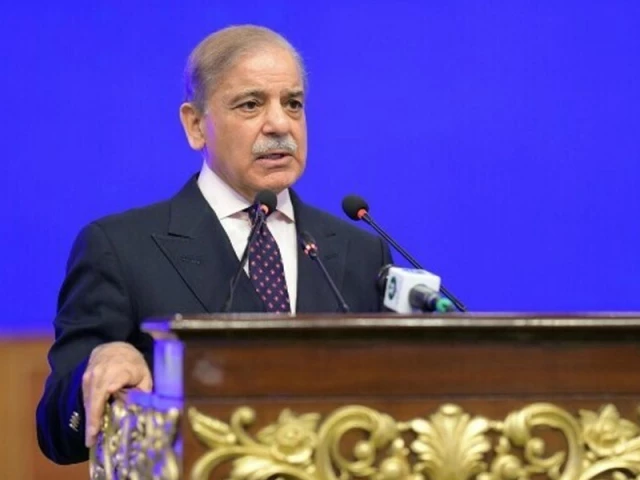Prime Minister Shehbaz Sharif. Photo: File
ISLAMABAD:
Highlighting the importance of CPEC and transnational rail and road projects, Prime Minister Shehbaz Sharif on Friday said the connectivity initiatives would synergize the economic strength of the regional countries and usher in a new era of enhanced trade, economic and energy cooperation in the region and beyond.
Addressing the concluding session of the two-day Regional Transport Ministers’ Conference held here, the Prime Minister said the cooperation in the trade and economic field was a win-win proposition that yielded rich dividends to all.
“This would strengthen our common interest in peace and strengthen efforts for development in the region. Let us together sow the seeds of cooperation so that we can reap the fruits of development and prosperity for our people, our region and beyond,” he said.
Hosted by the Ministry of Communications, with the theme “Regional Connectivity: Opportunities for the Region”, attended by transport ministers and
delegates from 20 countries as well as international organizations such as the Asian Development Bank, the Economic Cooperation Organisation, the International Road Transport Union and the UN Economic and Social Commission for Asia and the Pacific.
The Prime Minister told the gathering that for centuries present-day Pakistan had thrived on connectivity, as the region from the ancient Silk Road to today’s Belt and Road Initiative had always been a conduit of connectivity and opportunity.
“Today, changing geopolitical dynamics and the growing dominance of economic priorities have breathed new life into this ancient corridor, transforming it from a relic of the past to a strategic necessity for our future.”
He highlighted that Pakistan’s geography connected the warm waters of the Arabian Sea and the Persian Gulf as the country was located at the confluence of China, the Eurasian land bridge and the Middle East, calling it a unique tri-node of economic corridors linking China, Central Asia and the wider Middle East.
He said Pakistan’s long coastline also made the ports of Gwadar and Karachi important transit points on the Maritime Silk Road.
Shehbaz Sharif praised the vision and foresight of his brother and former Prime Minister Shehbaz Sharif, who also signed the China-Pakistan Economic Corridor, which had been a transformative experience for the region, connecting markets and people across China, Central Asia, South Asia and the Middle East, besides opening new routes for trade and energy cooperation.
He told the international gathering that after the success of its first phase, Pakistan was now entering an “exciting” phase of CPEC-2.0 centered on promoting business-to-business partnerships, enhancing investment opportunities for Chinese companies in Pakistan and promoting our mutual prosperity.
In addition, he said the country was working on a number of rail connectivity projects, such as the Trans-Afghan Railways and the Islamabad-Tehran-Istanbul link, as well as improved air links to the Central Asian republics, along with frameworks such as the TIR Convention.
Calling connectivity not only limited to roads, railways and air links but also on data, innovation and technological integration, Shehbaz Sharif said that Pakistan was investing in digital infrastructure to catch up with the fourth industrial revolution.
With 60% of Pakistan’s population aged between 15 and 30, which was both a challenge and a great opportunity, he said, “We may not have black gold, but our youth is our greatest asset, which is poised to be the harbinger of Pakistan’s rapid progress and prosperity in times to come.”
Later, the Prime Minister also visited the exhibition and went round various stalls set up by various organizations including National Logistics Corporation, National Highway Authority and Pakistan Railway.
He also interacted with representatives of various Pakistani companies there.
Earlier, in his closing remarks, Communications Minister Abdul Aleem Khan said the participants reaffirmed their commitment to strengthening connectivity as a path to shared opportunity and prosperity in the region.
They also reiterated their determination to pursue a vision of regional cooperation to strengthen economies.
The minister said the conference recognized the urgent need to create linkages, promote innovative financing and promote partnerships with international financial institutions.
Furthermore, he said the participants also highlighted the importance of liberal visa regimes and the need for road safety measures for vulnerable users.
He expressed hope that the discussions would serve as a basis for practical cooperation in the coming months and that the Government of Pakistan was ready to promote dialogue, joint ventures and initiatives to pursue the common agenda.



